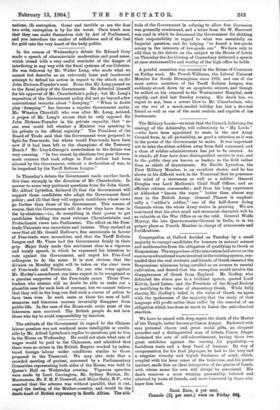The Military Lords—we trust that the Council, following the analogy
of the Admiralty, will collectively be "My Lords" —who have been appointed to seats in the new Army Council form, in all probability, as good a selection as it was in the power of the Government to make. It was important not to take the ablest soldiers away from field command, and a class of soldier-administrators has yet to be created. As it stands, all four have done distinguished service in war, and to the public they are known as leaders in the field rather than as chiefs of departments. Sir Neville Lyttelton, the First Military Member, is an excellent choice, and he has shown in his difficult work in the Transvaal that he possesses the mind of a statesman as well as a soldier. General Douglas was Lord Methuen's Chief Staff Officer, and an efficient column commander; and from his long experience at Aldershot "knows the ropes" better than almost any man in the British Army. General Plumer is emphati- cally a "soldier's soldier," one of the half-dozen living Generals whom the whole Army unites in praising. We are convinced that his alert mind and strenuous character will be as valuable at the War Office as on the veld. General Wolfe Murray, the late Quartermaster-General in India, is in his proper place as Fourth Member in charge of armaments and fortifications.






































 Previous page
Previous page